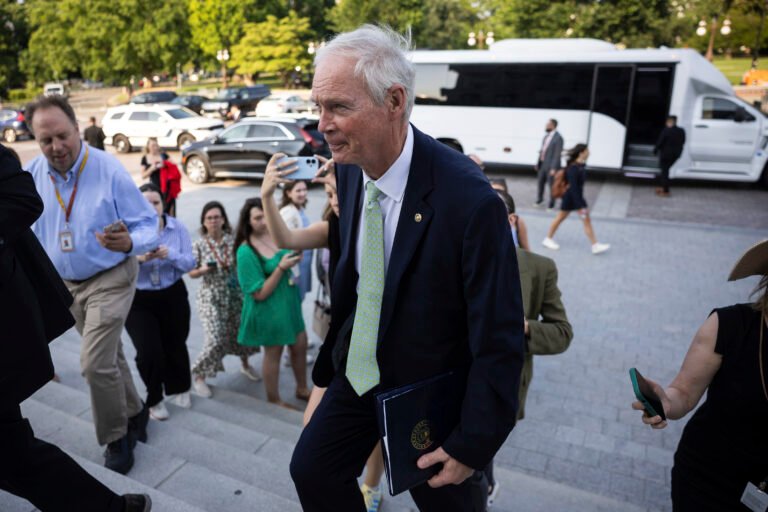
The protests in Los Angeles over the White House’s deportation efforts are providing a boost to the GOP’s “big, beautiful bill” as members come under pressure to approve fresh immigration enforcement funding or risk appearing on the side of California Democrats.
The White House and administration allies are using the protests to push members to line up behind the massive piece of legislation, highlighting the package’s border provisions while making the case that Immigration and Customs Enforcement (ICE) needs an infusion of support.
“It’s been a high priority before what happened in Los Angeles, and I think the American people are seeing firsthand what happens when lawlessness rules the streets and you’re undercutting the very important mission of ICE,” Sen. Steve Daines (R-Mont.), a top ally of Senate Majority Leader John Thune (R-S.D.), said.
“It helps illustrate the consequences of not having ICE fully supported, whether that is supported by government officials, as well as the needed financial support to make sure they have the capacity to do their job,” Daines added.
Senate Republicans are in the midst of a key week in the process of passing the bill — the linchpin of the party’s overall agenda — with an eye toward completing work by July 4. Though leaders are hoping to roll out key portions of the bill, deep divisions remain on crucial issues including taxes, deficit reduction, Medicaid and more.
But most Senate Republicans have long agreed that border provisions are a crucial part of the bill. Earlier this year, as Senate Republicans pushed an alternative two-bill approach, they included immigration funding in what would have been the first of two bills, aiming to quickly get it to Trump’s desk.
Instead, the need to consolidate House GOP support resulted in those being lumped together with extensions of the 2017 Tax Cuts and Jobs Ac in the single bill the party is considering now.
But while those items fell out of view for many, the Los Angeles tumult has brought them back to the surface.
The bill includes $46.5 billion to beef up the border wall, with $4.1 billion also going towards hiring 3,000 new Border Patrol agents and 5,000 new customs officers. More than $2 billion is included for signing and retention bonuses.
On top of that, the legislation includes an additional $1,000 fee for individuals filing for asylum in the U.S.
“It does probably add a little value to it, to the positioning of it,” Sen. Kevin Cramer (R-N.D.) said. “But for most Republicans, it’s why it was part of our first resolution. Securing the border is the one thing that can get everybody to vote for making Trump tax cuts permanent — if they needed any more encouragement to do that.”
Encouragement is exactly what some members are getting. Sen. Tom Cotton (R-Ark.), the No. 3 Senate Republican who leads the party’s messaging effort, sent out fresh talking points to the conference early in the week urging senators to condemn the rioters and the Democrats defending them. He signaled that the current legislative push should be a factor as well.
“Point out that this is another reason we need to pass our bill,” Cotton urged members, noting the funding increases for ICE and other law enforcement officers at the border.
The White House earlier in the week also used the opportunity to pan Sen. Rand Paul (R-Ky.), the most strident GOP holdout. Stephen Miller, a top White House aide, said the Kentucky Republican is “trying to cut funding for deportations and border security” amid the Los Angeles protests via his opposition to the bill.
Paul fired back.
“They’re just lying,” he told The Hill.
Paul is opposing the bill over its inclusion of a $4 trillion debt ceiling hike, though he has spoken favorably of much else that is included.
The back-and-forth also caught the attention of some Republicans amid this final stretch.
“I’m sure Stephen convinced Rand,” Cramer quipped. “One thing’s for sure: Stephen Miller and Rand Paul are two of the most securely-certain-of-themselves people. They’re certainly certain of their own positions.”
“There’s no ambiguity, nor is there any flexibility,” he continued. “It’s an amusing feud.”
Another Republican who still needs to be convinced to jump on board is Sen. Ron Johnson (R-Wis.), who has repeatedly complained the bill does not do enough to cut spending.
He also made the case on Tuesday that some of the border spending should be examined even though he is largely supportive of the border funding included.
“That’s the first thing we wanted to do. The Senate wanted to pass that with our budget reconciliation bill — border, defense, $850 billion of spending reduction. That would have been our first bite at the apple there. … We think that’s [our] top priority,” Johnson said. “That being said, I’d want to sharpen my pencil. I don’t know where the administration spends $6.6 billion in the first term to build 450 miles of fence, now we need $46.5 billion?”
“They’ve got to explain that to me,” he continued. “We’re $37 trillion in debt. We can’t be wasteful with any money, no matter how important … the use for it.”
The White House continued to press the case for the mammoth bill behind closed doors on Tuesday as it presented polling data for Senate Republicans during a luncheon at the National Republican Senatorial Committee (NRSC).
According to multiple attendees, Senate Republicans were urged to highlight provisions that polled well in internal surveys, including no taxes on tips and work requirements for Medicaid.
“That was the bottom line,” Sen. Shelley Moore Capito (R-W.Va.), a member of Senate GOP leadership, told reporters.
But overall, it’s the border security component they still believe will carry weight, especially after what they view as an effective push in the opening months of Trump’s second term.
A source familiar also noted that the members were shown an ad by Cotton’s super PAC going after Sen. Jon Ossoff (Ga.), the foremost Democrat who Republicans hope to unseat next year, over his opposition to Medicaid cuts for those in the country without authorization.
“It sort of highlights what we’re up against. We need to confront mass migration with mass deportations. President Trump ran on that,” said Sen. Eric Schmitt (R-Mo.), a top Trump ally. “In order to do that, you need tools, you need facilities and you need ICE agents to go do it.”
“Maybe I shouldn’t be surprised, [but] I actually just can’t believe that the Democrats, again, are sort of doing this all over again on the immigration debate,” he said. “The American people do not want people here illegally. They support law enforcement, with deportations, and to make this hill to die on, once again, is … a losing argument for them.”

